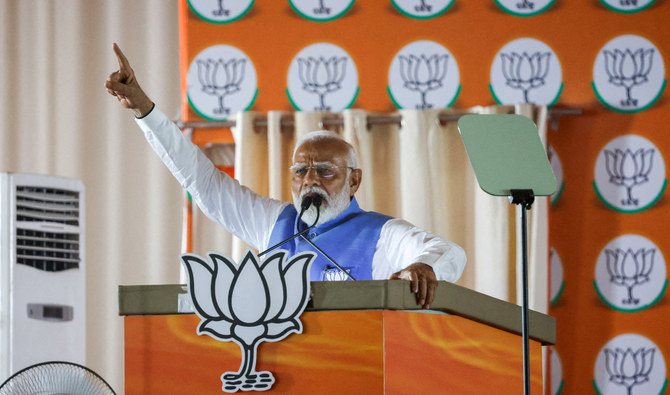NEW DELHI: India’s six-week election was staggering in its size and logistical complexity, but also in the “unprecedented” scale of online disinformation.
The biggest democratic exercise in history brought with it a surge of false social media posts and instant messaging, ranging from doctored videos to unrelated images with false captions.
Raqib Hameed Naik, from the US-based India Hate Lab, said they had “witnessed an unprecedented scale of disinformation” in the elections.
“Conspiracy theories... were vigorously promoted to deepen the communal divide,” said Naik, whose organization researches hate speech and disinformation.
With seven stages of voting stretched over six weeks, AFP factcheckers carried out 40 election-related debunks across India’s political divide.
There were fake videos of Bollywood stars endorsing the opposition, as well as those purporting to show one person casting multiple votes.
Some were crude or poked fun.
Others were far more sinister and sophisticated productions aimed to deliberately mislead.
All were widely shared.
Prime Minister Narendra Modi’s Hindu-nationalist Bharatiya Janata Party (BJP) came under fire for posts stoking sectarian tensions with India’s minority Muslim community of more than 200 million.
These included numerous videos, matching incendiary campaign speeches by Modi, falsely claiming his opponents were planning to redistribute India’s wealth in favor of Muslims.
Naik said such posts “aimed at stoking fear and animosity toward Muslims to polarize voters along religious lines.”
“The ruling party’s strategy of exploiting religious sentiments for electoral gain has not only undermined the integrity of the democratic process but also sowed dangerous seeds of division and hatred in society,” he said.
False information was detected across the political spectrum but the leader of the opposition Congress party, Rahul Gandhi, was one of the leading targets.
His statements, videos and photographs were shared on social media, but often incompletely or out of context.
One digitally altered video analyzed by AFP used Gandhi’s real boast that the opposition alliance would triumph, but flipped it to say Modi would win a third term when the result is declared on Tuesday.
Others purported to show Gandhi falsely appealing to people to vote for Modi.
Among the more egregious examples were those falsely linking him to India’s rival neighbors, Pakistan and China.
Those included a photograph that claimed Gandhi was waving the “Chinese constitution” during an election rally. It was in fact that of India.
Other posts portrayed Gandhi, a Hindu, as being against India’s majority religion, capitalizing on Modi’s efforts to cast himself as the country’s most staunch defender of the faith.
One video of a ruined Hindu temple, a real image from Pakistan, was widely shared.
However, the post falsely claimed it was from Gandhi’s constituency and that he was responsible for its destruction.
Another manipulated video falsely showed him refusing to accept a statue of a Hindu god.
One more claimed he was paying young people to support him on social media, when in reality he was talking about youth unemployment.
They were all widely shared by BJP supporters.
While political parties across the board have well-oiled digital outreach and social media teams, critics said the BJP’s sophisticated online campaign was driving posts.
Gandhi has alleged vast sums were “spent to distort my image” and blamed Modi’s party.
However, opposition parties also spread disinformation targeting the BJP and glorifying Congress.
Several digitally manipulated videos of two Bollywood actors criticizing the BJP and appealing to the public to vote for the Congress party were published.
Social media users also shared an old video to falsely accuse the ruling party of tampering with an electronic voting machine to rig the election in its favor.
“Overall, trust in content itself is falling,” said Joyojeet Pal, an expert in the role of technology in democracy from the University of Michigan.
Pal told AFP that Indian social media users widely understood the prevalence of disinformation and doctored content during the election.
“So there is a very good chance that they do not believe the doctored content to be real,” he said.
“However, there is a good chance they will forward these anyway because they align with their beliefs.”






















